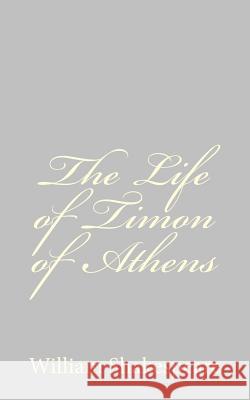The Life of Timon of Athens » książka
The Life of Timon of Athens
ISBN-13: 9781489511973 / Angielski / Miękka / 2013 / 112 str.
The Life of Timon of Athens
ISBN-13: 9781489511973 / Angielski / Miękka / 2013 / 112 str.
(netto: 30,37 VAT: 5%)
Najniższa cena z 30 dni: 31,80
ok. 16-18 dni roboczych
Dostawa w 2026 r.
Darmowa dostawa!
Timon of Athens is a play by William Shakespeare about the fortunes of an Athenian named Timon (and probably influenced by the philosopher of the same name, as well), generally regarded as one of his most obscure and difficult works. Originally grouped with the tragedies, it is generally considered one, but some scholars group it with the problem plays. In the beginning, Timon, later a misanthrope, is a wealthy and generous Athenian gentleman. He hosts a large banquet, attended by nearly all the main characters. Timon gives away money wastefully, and everyone wants to please him to get more, except for Apemantus, a churlish philosopher whose cynicism Timon cannot yet appreciate. He accepts art from Poet and Painter, and a jewel from the Jeweller, but by the end of Act 1, he has given that away to another friend. Timon's servant, Lucilius, has been wooing the daughter of an old Athenian. The man is angry, but Timon pays him three talents in exchange for the couple being allowed to marry, because the happiness of his servant is worth the price. Timon is told that his friend, Ventidius, is in debtor's prison. He sends money to pay Ventidius's debt, and Ventidius is released and joins the banquet. Timon gives a speech on the value of friendship. The guests are entertained by a masque, followed by dancing. As the party winds down, Timon continues to give things away to his friends; his horses, and other possessions. The act is divided rather arbitrarily into two scenes but the experimental and/or unfinished nature of the play is reflected in that it does not naturally break into a five-act structure. Now Timon has given away all his wealth. Flavius, Timon's steward, is upset by the way Timon has spent his wealth, overextending his munificence by showering patronage on the parasitic writers and artists, and delivering his dubious friends from their financial straits; this he tells Timon when he returns from a hunt. Timon is upset that he has not been told this before, and begins to vent his anger on Flavius, who tells him that he has tried repeatedly in the past without success, and now he is at the end; Timon's land has been sold. Shadowing Timon is another guest at the banquet: the cynical philosopher Apemantus, who terrorises Timon's shallow companions with his caustic raillery. He was the only guest not angling for money or possessions from Timon. Along with a Fool, he attacks Timon's creditors when they show up to make their demands for immediate payment. Timon cannot pay, and sends out his servants to make requests for help from those friends he considers closest. Performance history in Shakespeare's lifetime is unknown, though the same is also true of his more highly regarded plays such as Antony and Cleopatra and Coriolanus, which most scholars believe were written in the same period. The play's date is uncertain, though its bitter tone links it with Coriolanus and King Lear. John Day's play Humour Out of Breath, published in 1608, contains a reference to "the lord that gave all to his followers, and begged more for himself" - a possible allusion to Timon that would, if valid, support a date of composition before 1608. It has been proposed that Shakespeare himself took the role of the Poet, who has the fifth-largest line count in the play.
Zawartość książki może nie spełniać oczekiwań – reklamacje nie obejmują treści, która mogła nie być redakcyjnie ani merytorycznie opracowana.











